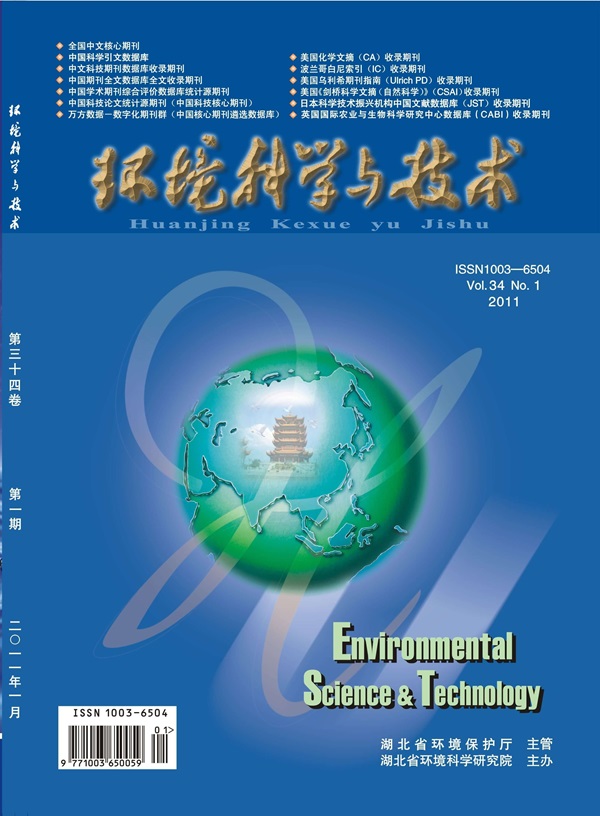Arsenic Methylation by a Sulfate-Reducing Bacterium from Paddy Soil Harboring a Novel ArsSM Fusion Protein
IF 10.8
1区 环境科学与生态学
Q1 ENGINEERING, ENVIRONMENTAL
引用次数: 0
Abstract
Microbial arsenic (As) methylation is an important process of As biogeochemistry. Only a few As-methylating microorganisms have been isolated from paddy soil, hindering the mechanistic understanding of the process involved. We isolated 54 anaerobic and 32 aerobic bacteria from paddy soil with a high As methylation potential. Among the 86 isolates, 14 anaerobes, including 7 sulfate-reducing bacteria (SRB), but none of the aerobes were able to methylate arsenite [As(III)] or monomethylarsenite [MMA(III)] or both, suggesting that the As-methylating ability is much more prevalent in anaerobes than in aerobes. We performed a detailed investigation on As methylation by a SRB isolate, Solidesulfovibrio sp. TC1, and identified a novel bifunctional enzyme consisting of a fusion of As(III) S-adenosylmethionine (SAM) methyltransferase (ArsM) and a radical SAM protein. The enzyme (ArsSM) can catalyze As(III) methylation to MMA and DMA and subsequent adenosylation of DMA to form 5′-deoxy-5′-dimethylarsinoyl-adenosine (DDMAA), which is a key intermediate in the biosynthesis of arsenosugars. High concentrations of sulfide produced by SRB did not affect As(III) methylation to MMA but inhibited MMA methylation to DMA. Genes encoding ArsSM fusion proteins are widespread in anaerobes, particularly SRB, suggesting that ArsSM-carrying anaerobes may play an important role in As methylation in an anoxic environment.

水稻土中硫酸盐还原菌对砷的甲基化作用,该菌携带一种新型 ArsSM 融合蛋白
微生物砷(As)甲基化是砷生物地球化学的一个重要过程。从水稻田土壤中分离出的砷甲基化微生物为数不多,这阻碍了对相关过程的机理认识。我们从水稻土壤中分离出 54 种厌氧细菌和 32 种好氧细菌,它们具有很高的砷甲基化潜力。在这 86 个分离菌中,有 14 个厌氧菌(包括 7 个硫酸盐还原菌 (SRB))能够甲基化亚砷酸盐[As(III)]或单甲基砷酸盐[MMA(III)],但没有一个需氧菌能够同时甲基化这两种物质。我们对一种 SRB 分离物 Solidesulfovibrio sp.TC1,发现了一种新型双功能酶,由 As(III) S-腺苷蛋氨酸(SAM)甲基转移酶(ArsM)和自由基 SAM 蛋白融合而成。这种酶(ArsSM)能催化 As(III)甲基化为 MMA 和 DMA,并随后催化 DMA 腺苷化,形成 5′-脱氧-5′-二甲基胂酰腺苷(DDMAA),而 DDMAA 是砷糖生物合成过程中的一个关键中间体。SRB 产生的高浓度硫化物不会影响 As(III) 甲基化为 MMA,但会抑制 MMA 甲基化为 DMA。编码 ArsSM 融合蛋白的基因广泛存在于厌氧菌(尤其是 SRB)中,这表明携带 ArsSM 的厌氧菌可能在缺氧环境中的砷甲基化过程中发挥重要作用。
本文章由计算机程序翻译,如有差异,请以英文原文为准。
求助全文
约1分钟内获得全文
求助全文
来源期刊

环境科学与技术
环境科学-工程:环境
CiteScore
17.50
自引率
9.60%
发文量
12359
审稿时长
2.8 months
期刊介绍:
Environmental Science & Technology (ES&T) is a co-sponsored academic and technical magazine by the Hubei Provincial Environmental Protection Bureau and the Hubei Provincial Academy of Environmental Sciences.
Environmental Science & Technology (ES&T) holds the status of Chinese core journals, scientific papers source journals of China, Chinese Science Citation Database source journals, and Chinese Academic Journal Comprehensive Evaluation Database source journals. This publication focuses on the academic field of environmental protection, featuring articles related to environmental protection and technical advancements.
 求助内容:
求助内容: 应助结果提醒方式:
应助结果提醒方式:


